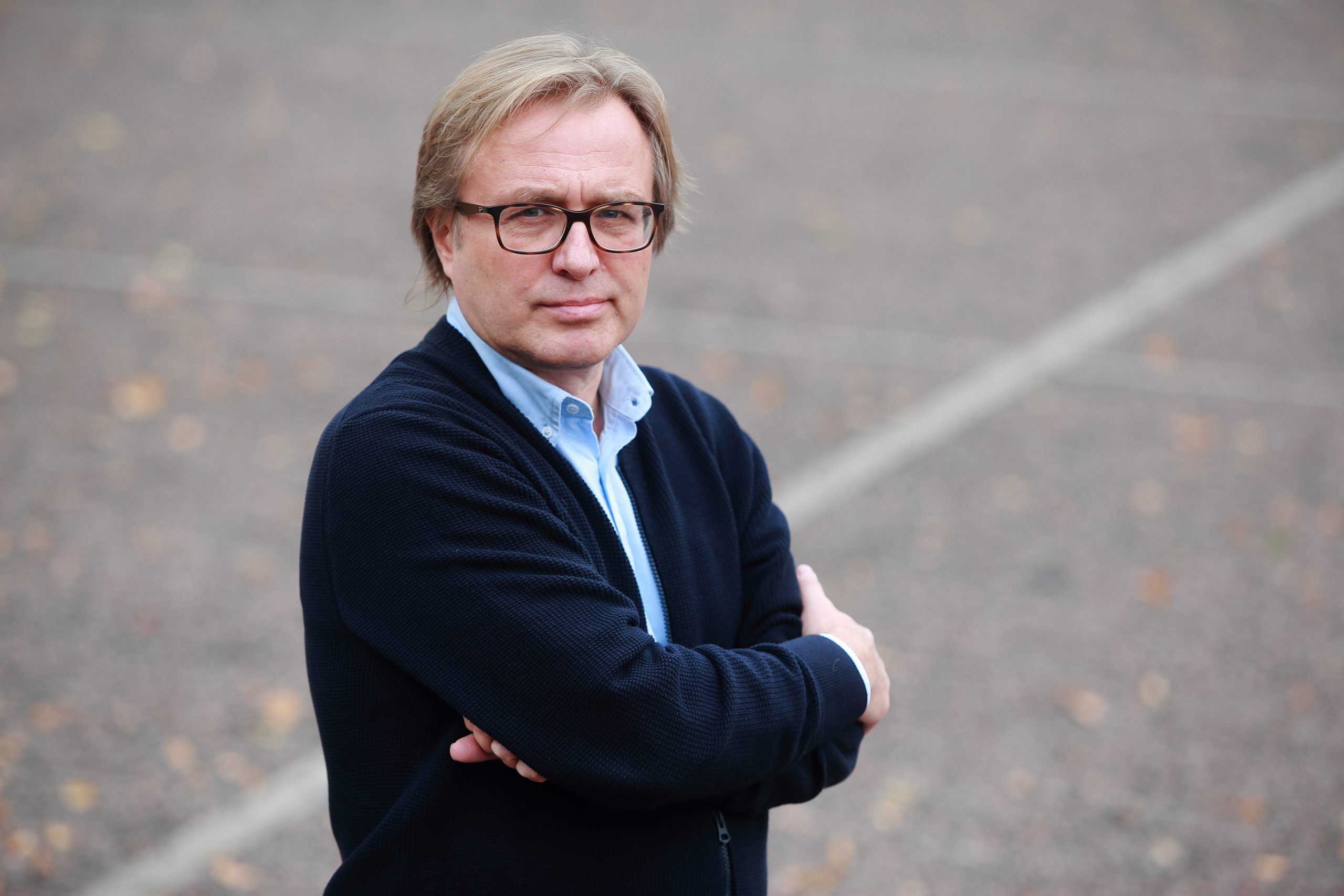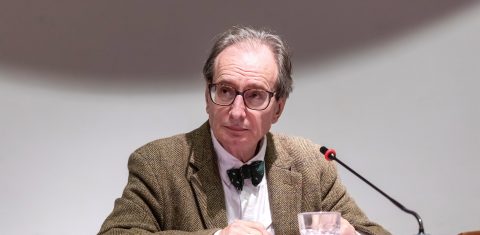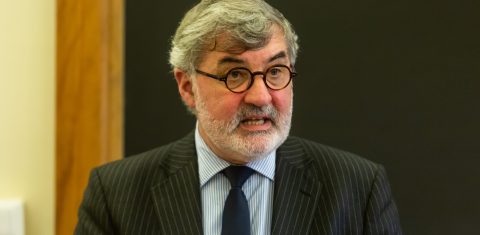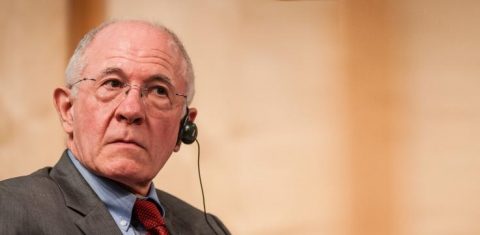Introducing his initial thoughts, Prof Gawin emphasized the pluralism of interpretation when it comes to Solidarity. He outlined its revolutionary narrative thread, and likewise the one of Polish insurrection tradition. In this presentation however, he focused on its portrayal within the light of the paradigm of the republic. In his view this provides a better understanding of the key aspects of what took place during the August events while exposing at the same time inherent weaknesses that come with a republic. Gawin called to mind here the intensely emotional accounts of the partakers of the strike, who were experiencing momentous existential moments that often came with a psychosomatic dimension (‘I was continually crying […] being overwhelmed by the freedom and liberty, a friend of ours fell into a state of shock. He had to return to Warsaw as he couldn’t stop throwing up’).
In tracing the genesis of this kind of manner in experiencing the August events, as a key for further interpretation Gawin looked to the thoughts of Hanna Ardent whose thoughts in turn anticipated thinking of classical Communitarianists theorists as Alasdair MacIntyre and Charles Taylor. Sketching out a backdrop to these initial deliberations Prof Gawin further called to mind the reasons behind the liberal and republican tensions in America that begun in the 60s. He notices how within the unusually complex worldview discussion, the deciding factor lies in the differing way that we understand the concept of the citizen and citizen life. With a republican outlook citizens make for a type of ethical ideal, where the community becomes a key element, while with liberalism the good of the individual becomes the starting point. Hannah Ardent faithfully keeps to Aristotle’s trope in developing her own view of the uniqueness of the person as a communicative being able to lead a political life. It is thanks to the mutual working together of the people, as Gawin here underlines in accordance with Ardent, that citizens may account for their own liberty and freedom experiencing ‘a particular type of satisfaction and elevation’. He further points to another essential aspect that comes with life within citizenship, that being the role that communities have in the recording of memories and events. ‘The memory of great events and deeds require the existence of communities that regard them as essential to their own identity’ – he explained. It is this republican spirit, understood in this context, within which Gavin further outlines the sentiments that took hold in Gdańsk in the summer of 1980, putting them in alignment with the times of Pericles and the Founding Fathers of America.
With a republican outlook citizens make for a type of ethical ideal, where the community becomes a key element, while with liberalism the good of the individual becomes the starting point.
Continuing on, Gawin turned to analysing the etymological roots of the word polis including in the spectrum of its meaning a native ground and presenting the Gdańsk Shipyard as its emanation. In the footsteps of Arendt he links this unique and rarely occurring type of human community as being separate to the sphere of biological inevitability. In drawing out the analogy of the shipyard setting to the polis of Athens, he pictured it as a dwelling that was unusually dynamic, as was with an earlier politics. All on strike were bound by an unusually strong allegiance to their cause – res publica. Within this context Gawin notes the particular character of the term Solidarity, that neither suggests a political institution nor an ideology, but rather a certain kind of universal account between peoples.
In the next part of his discussion, Prof Gawin turned his attention to the transformational character of the August events on the partakers in the strike. He noted a rather unique metamorphosis that took place with the workers battling for a higher wage, into a citizen community. Most importantly, we bring to mind the rule of dignity that comes with each individual person, and so away with the poor and harmful stereotype of the common or vulgar worker, the derogatory pleb. A logical outcome of these processes, shows Gawin, was the natural way that laws of equality took hold within the shipyard milieu and the way in which ties of closeness and friendliness naturally developed out of this, quite the opposite to babylonian anonymity and a lack of identity within the masses.
Singularly the Church proved to be the institution that did not forsake nor betray the interests of the nation.
Another point Gawin wanted to analyse here was language. This new backdrop for Solidarity came to be a field for democratic debate that erupted in unusual fashion. The opinions of citizens that were finally entering into the light of day, began to make for public debate. This new ‘parameter of public debate’ served to strengthen and validate the new equality in society that resulted from the August events.
Gawin pointed yet to another significant role within Solidarity that accounted for ‘recovering Polish history’. As he noted, the period of many years of control upon Polish culture had somewhat cut the people off from political traditions. Gavin here compares the August events to a certain kind of state of nature as it were, as Poles being immersed within an ebullient stream of the revolution of the republic.
The next aspect of the tradition of republicanism that Gawin analyses here and which finds its parallel in the August strikes, is the presence of religion. ‘Singularly the Church proved to be the institution that did not forsake nor betray the interests of the nation’ – he noted.
In his analysis Gawin highlights certain shortcomings of republicanism as being instrumental for hermeneutics. At this point he harks back to the thoughts of Hannah Arendt, whose concepts exclude aggressive and abusive force from the sphere of what belongs to politics. This arises from the communicative nature of politics represented as ‘a muted force’. Gawin does flesh out inconsistencies here however in the mind of this author of The Human Condition and the problems and issues that come with realising the understanding of greek citizen virtues associated with this approach of aggressive force. He further notices that the conditions for the ideal that are there presented do not however present themselves in Solidarity – as a momentous social movement which seems to be entirely lacking the approach of political aggressive force. He adds furthermore, that the spectre of abusive force was nevertheless waiting in the wings as it were as one of several options. This aside, the citizen communities knowingly and in solidarity set themselves head on against the threat of abusive force by the tyrannical government. Though not ultimately making use of abusive force, they won a war of who could hold their nerve the longest. War brings with it the risk of life. If therefore present was the willing risk of one’s life in defence of one’s own freedoms, this does indeed fulfil the rudimentary requirements of classical republicanism – in crossing the limits of one’s own biology – he continued.
In the closing part of his discussion, Prof Gawin drew attention to challenges that the republican spirit will inevitably meet during times of apparent political stability. For the context of a ‘republican pathos’ to arise, key is an encroaching risk of abusive political force, or its full presence. Keeping up an intensity as was seen in the events of August in the ’80s is not something that comes naturally nor proves tenable in the long term. According to Gawin, herein lies the problem that is immanent for republicanism, the difficulty of harnessing its spirit institutionally. The republican tradition is therefore not so much a realistic project as it is a normative utopia, a gauge, which can be applied to political and social reality and serving its critical analysis – adds Gawin here.
In summarising his deliberations, Prof Gawin honed our attention on a key truth in reflecting upon the phenomenon of Solidarity for current global challenges. He calls to mind here the tensions taking place with borders in the east, between freedom and tyranny, and the shortcomings within democracy versus terrorism. An understanding of the August events may well be a very timely and significant guidepost to a true defining of the ideals of freedom, politics and community.
Summary: Hanna Nowak
Full text of the lecture can be found here.




